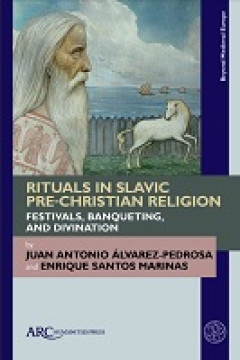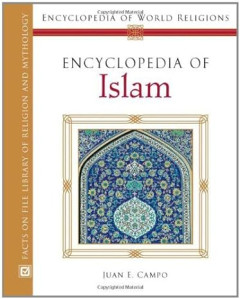Ditapis dengan
E-book The Art of Neighbouring. Making Relations Across China's Borders
Over the past decades, living in proximity to an increasingly powerful China has gained new meanings. ‘Rising China’ – the nation, the notion, and the buzzword – sparks dreams and triggers fears. Borders that were closed during the Cold War era have again become zones of contact and exchange. Old trade routes are revived, new economic corridors established, and remote border …
- Edisi
- -
- ISBN/ISSN
- 9789048532629
- Deskripsi Fisik
- 269 hlm
- Judul Seri
- -
- No. Panggil
- 327 ZHA t

E-book Rituals in Slavic Pre-Christian Religion: Festivals, Banqueting, and D…
The authors comprehensively analyze all the available information regarding the ritual practices of Slavic pre-Christian religion that can be found in written medieval texts. After investigating every kind of reference to such practices, they offer a reconstruction of Slavic pre-Christian religion on the basis of these medieval testimonies. In doing so, they overcome the challenges presented by…
- Edisi
- -
- ISBN/ISSN
- 9781641892063
- Deskripsi Fisik
- 134 halaman, ilus.
- Judul Seri
- -
- No. Panggil
- 299.0 ALV r

E-book Encyclopedia of Islam
Among the world’s religions, few have attained thehistorical, cultural, and civilizational stature anddiversity that Islam has. Since the seventh century, when it first emerged in the western region of the Arabian Peninsula known as the Hijaz, ithas been continuously adapted and carried forthby its adherents, who call themselves Muslims, tonew lands and peoples in the wider Middle East, Afric…
- Edisi
- -
- ISBN/ISSN
- 9780816054541
- Deskripsi Fisik
- 801
- Judul Seri
- -
- No. Panggil
- 297.03 CAM e
E-book Energy in the Americas; Energy in the Americas : Critical Reflections …
One of the most notable features of any survey of the history of energy regimes in the Americas over the past century is the “pendulum effect.” Anecdotal though the observation may be, it is clear that despite the broad and incremental transformational changes that have occurred in the global energy landscape over time, individual countries have un…
- Edisi
- -
- ISBN/ISSN
- 978155238940
- Deskripsi Fisik
- 403 hlm
- Judul Seri
- -
- No. Panggil
- 338.27 MON e

E-Book Astrophysics, Astronomy and Space Sciences in the History of the Max P…
This book provides the first comprehensive historical account of the evolution of scientific traditions in astronomy, astrophysics, and the space sciences within the Max Planck Society. Structured with in-depth archival research, interviews with protagonists, unpublished photographs, and an extensive bibliography, it follows a unique history: from the post-war relaunch of physical sciences in W…
- Edisi
- -
- ISBN/ISSN
- 9789004529137
- Deskripsi Fisik
- 745 halaman
- Judul Seri
- -
- No. Panggil
- 523.01 BON a

E-Book I'm Not Gonna Die in This Damn Place
By the time of the Vietnam War era, the “Mexican American Generation” had made tremendous progress both socially and politically. However, the number of Mexican Americans in comparison to the number of white prisoners of war (POWs) illustrated the significant discrimination and inequality the Chicano population faced in both military and civilian landscapes. Chicanos were disproportionately…
- Edisi
- -
- ISBN/ISSN
- 9781628953213
- Deskripsi Fisik
- 217 halaman
- Judul Seri
- -
- No. Panggil
- 940.54
E-book Politics Meets Policies : The Emergence of Programmatic Political Parties
The underlying idea linking all contributions to this book is that multiple factors facilitate the emergence of programmatic political parties; they do not fit into a simple formula or a particular sequencing or hierarchy, and operate in ways that seem very contextual. Those influencing factors, as will be discussed further in the concluding chapter, can be categorized according to their facili…
- Edisi
- -
- ISBN/ISSN
- 9789187729423
- Deskripsi Fisik
- 139 hlm
- Judul Seri
- -
- No. Panggil
- 324.2 CHE p
E-book New World Objects of Knowledge : A Cabinet of Curiosities
Unlike the items in Neil MacGregor’s bestselling A History of the World in 100 Objects, our small cabinet’s curious objects cannot be found in a single museum.1 The reasons for this are several. First, from the late 15th century down to our own day, the New World, and in particular that part of it now called Latin America, has been plundered and pilfered fo…
- Edisi
- -
- ISBN/ISSN
- 978-1-908857-83-5
- Deskripsi Fisik
- 299 hlm
- Judul Seri
- -
- No. Panggil
- 909 THU n
 Karya Umum
Karya Umum  Filsafat
Filsafat  Agama
Agama  Ilmu-ilmu Sosial
Ilmu-ilmu Sosial  Bahasa
Bahasa  Ilmu-ilmu Murni
Ilmu-ilmu Murni  Ilmu-ilmu Terapan
Ilmu-ilmu Terapan  Kesenian, Hiburan, dan Olahraga
Kesenian, Hiburan, dan Olahraga  Kesusastraan
Kesusastraan  Geografi dan Sejarah
Geografi dan Sejarah